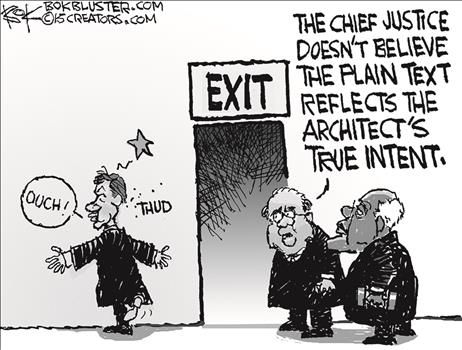We heard rather a lot from John Roberts, during his confirmation hearings, about the importance of judicial restraint. It’s one of the shibboleth phrases of the Right, to which obeisance is paid but seldom is more than lip service given. Just this past week, Jeb Bush, now a candidate for the Republican presidential nod, echoed the phrase when he was asked about how he would select federal judges were he elected.
So what do these worthies think it means? Not the dictionary meaning, mind you, but the meaning its most conspicuous users put to it by their actions.
One interpretation of the phrase is found in the judicial doctrine of stare decisis. That’s rough Latin for let the decision stand. Its black-robed users mean by it We defer to earlier decisions of this body, feeling it would be wrong to overturn them. Wrong why? Sometimes there is no reason other than stare decisis itself: the unwillingness to overrule an earlier decision, sometimes because subsequent law and government action might have been founded on it, sometimes out of an unarticulated fear that it might somehow reduce the authority of the Supreme Court.
Viewed thus, judicial restraint protects tyranny quite as well as anything else.
The role of the Supreme Court as stated in the Constitution seems relatively simple and straightforward:
The judicial Power shall extend to all Cases, in Law and Equity, arising under this Constitution, the Laws of the United States, and Treaties made, or which shall be made, under their Authority;—to all Cases affecting Ambassadors, other public Ministers and Consuls;—to all Cases of admiralty and maritime Jurisdiction;—to Controversies to which the United States shall be a Party;—to Controversies between two or more States;—between a State and Citizens of another State; —between Citizens of different States, —between Citizens of the same State claiming Lands under Grants of different States, and between a State, or the Citizens thereof, and foreign States, Citizens or Subjects. In all Cases affecting Ambassadors, other public Ministers and Consuls, and those in which a State shall be Party, the supreme Court shall have original Jurisdiction. In all the other Cases before mentioned, the supreme Court shall have appellate Jurisdiction, both as to Law and Fact, with such Exceptions, and under such Regulations as the Congress shall make. [Article III, Sections 1 and 2]
Continue reading “The Ultimate Manifesto, Part 1: “Judicial Restraint””





